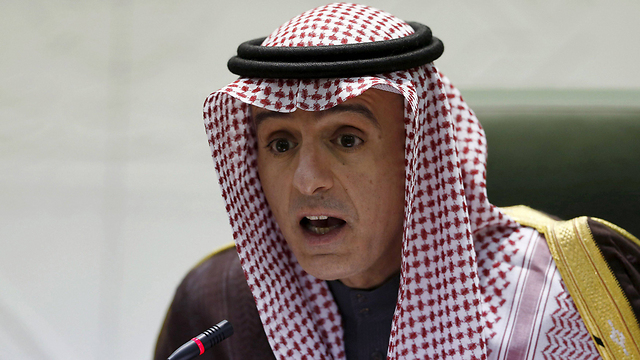Saudi FM Says Hizbullah to Blame for Lebanon Political Vacuum
News Agencies/June 28/16
Saudi Foreign Minister Adel al-Jubeir on Tuesday blamed Hizbullah and Iran for the protracting political vacuum in Lebanon, a day after the party accused Riyadh of blocking political solutions in the country. “Hizbullah, with Iranian support, is to blame for the political vacuum in Lebanon seeing as it is obstructing any effort aimed at resolving the presidential void crisis,” said Jubeir at a joint press conference he held with his French counterpart Jean-Marc Ayrault. “The entire world is aware of Iran’s support for terrorism and its attempts to undermine stability in the region,” the Saudi minister added. “Tehran must respect the principle of good neighborliness and must give up the principle of exporting revolution,” he said. On Monday, Hizbullah deputy chief Sheikh Naim Qassem accused Saudi Arabia of blocking political solutions in Lebanon and the election of a new president. “The reason behind the presidential vacuum is that local political forces are awaiting foreign instructions, especially a Saudi decision,” said Qassem during a Hizbullah educational ceremony. “Saudi Arabia is keeping Lebanon in the waiting zone and it is not agreeing to any solutions that are in Lebanon’s interest. It sends orders and its people here repeat like parrots,” Hizbullah number two added. Lebanon has been without a president since the term of Michel Suleiman ended in May 2014 and Hizbullah, the Free Patriotic Movement and some of their allies have been boycotting the electoral sessions at parliament, stripping them of the needed quorum. Al-Mustaqbal Movement leader ex-PM Saad Hariri, who is close to Saudi Arabia, launched an initiative in late 2015 to nominate Marada Movement chief MP Suleiman Franjieh for the presidency but his proposal was met with reservations from the country’s main Christian parties as well as Hizbullah. Hariri’s move was followed by Lebanese Forces leader Samir Geagea’s endorsement of his long-time Christian foe, FPM founder MP Michel Aoun, for the presidency after a rapprochement deal was reached between their two parties. The supporters of Aoun’s presidential bid argue that he is more eligible than Franjieh to become president due to the size of his parliamentary bloc and his bigger influence in the Christian community.
Qahwaji Says Woman among Qaa Bombers, Mashnouq Says They Didn’t Come from Camps
Naharnet/June 28/16/Prime Minister Tammam Salam presided over an emergency security meeting at the Grand Serail on Tuesday, in the wake of the unprecedented multiple suicide bombings that hit the eastern border town of al-Qaa on Monday. “The (Syrian refugee) encampments have nothing to do with the issue of the suicide bombers who targeted the Bekaa town of al-Qaa,” Interior Minister Nouhad al-Mashnouq announced after the meeting, adding that the conferees have decided to convene when necessary to follow up on the security developments. “We have taken the necessary measures and seven cells had been arrested before managing to carry out any act,” he reassured. An official statement issued after the meeting said the attack “represents a turning point in the war that the organizations of obscurantist terror are waging against the Lebanese state and people and it may be an indication of a new and fiercer phase in the confrontation with the obscurantist terror, which is actively seeking to harm Lebanon and drag it into the inferno of chaos and destruction.” The conferees, however, cautioned that “the terrorist attack must not become an excuse for any form of autonomous security,” urging al-Qaa’s residents and all Lebanese to “hold onto the role of the legitimate armed forces, which are exclusively entrusted under the law with preserving the safety of people.”Prior to the meeting, Mashnouq had noted that “the suicide bombers came from their ’emirate’ in Syria, not from the refugee encampments.”“The confrontation with terrorism is open,” he added. Army Commander General Jean Qahwaji for his part announced that “we are definitely before a new phase in the terrorists’ modus operandi.”“Al-Qaa’s suicide bombers included a woman and three Syrians,” he said. Mashnouq, however, announced after the meeting that the bombers did not include any woman. General Security chief Maj. Gen. Abbas Ibrahim meanwhile announced before the Grand Serail meeting that “security agencies had information about expected bombings due to the confessions of some detainees during interrogation.”Earlier in the day, the government called on all citizens to “embrace the legitimate armed forces” and not to “surrender to panic,” declaring that it will maintain “full readiness” to follow up on any developments. It warned that “the unprecedented method in which the attacks were carried out represents the beginning of a new chapter in the confrontation between the State and terrorism.”“All political forces must address the issue in a national and not a partisan manner and everyone must shun autonomous security,” the government added. Four suicide bombings rocked the eastern border town of al-Qaa on Monday evening, injuring eight people, only hours after four suicide bombers killed five people and wounded 15 others in the town before dawn. Three suicide bombers riding motorcycles blew themselves up in the evening in the center of the predominantly Christian town.In the pre-dawn attack, five people were killed and fifteen others were wounded when four suicide bombers targeted the town. The suicide explosions struck at 10 minute intervals. Lebanon hosts more than 1.1 million Syrians, a huge burden for the country of four million people. Several Lebanese politicians have warned about the inability of the country to bear this burden and had already called for the closure of borders after incidents. Al-Qaa is one of several border posts separating Lebanon and war-torn Syria and is predominantly Christian although one district, Masharii al-Qaa, is mainly Sunni Muslim and home to a large number of Syrian refugees. Suicide blasts in the area have typically targeted checkpoints or military installations and rarely include more than one attacker. In August 2014, the army clashed with the Islamic State group and al-Nusra Front, al-Qaida’s affiliate in Syria, in the border town of Arsal.






















